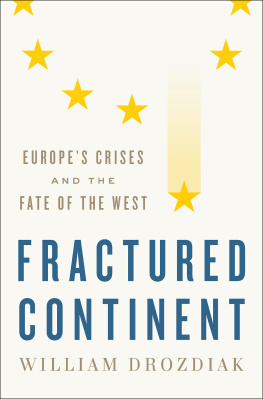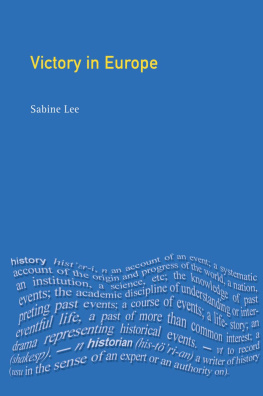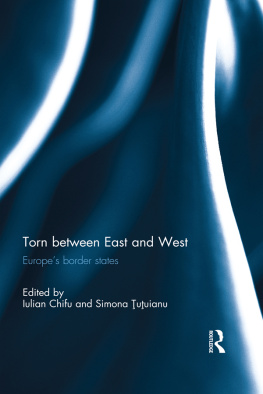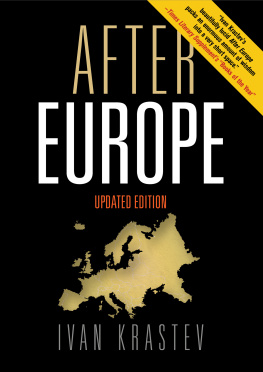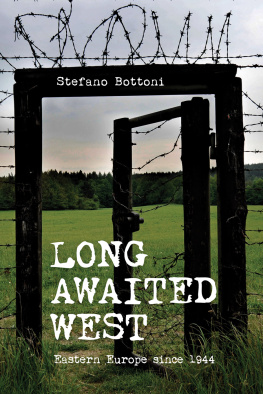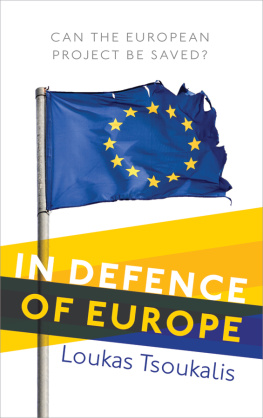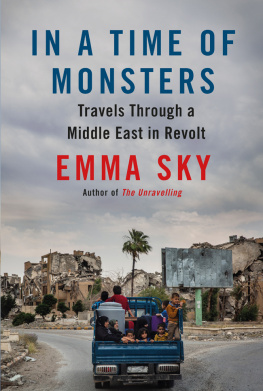
For Renilde
in love and friendship
This book is the result of more than a year of travel, interviews, and research across Europe, but also the distillation of four decades of personal involvement in the Atlantic partnership. During that time, I have benefited from the wisdom and experience of many people I have come to know and admire in government, business, nonprofit organizations, and the media on both sides of the pond. I am profoundly grateful for their generosity and patience in teaching me about the fascinating complexities of a continent that still serves as the cradle of Western civilization and the fulcrum of American interests in the world.
One of the most enjoyable aspects of this project was the ability to spend time in Europe with old friends and acquaintances cultivated over the years during my different stages in life. I first moved to Europe in the 1970s to play professional basketball. I had graduated from the University of Oregon and been drafted by the Golden State Warriors, but my playing skills were too limited to sustain a career in the NBA. I found a comfortable niche playing ball in Europe, where I encountered strange languages, great cuisine, amazing art, captivating literature, and warm hospitality from many new friends made while playing in diverse places across Italy, Spain, France, and Belgium. There, I decided to pursue graduate studies at the Collge dEurope in Bruges, while continuing my playing career. Not much studying was done in Bruges, but it was an exhilarating time as Britain, Ireland, and Denmark were joining the community of nations that would become known as the European Union. In Bruges, I also met a young Belgian woman who would go on to serve her country as a distinguished diplomat and ambassador, but more important to me, would also eventually become my wife, lifelong friend, and mother of our three children.
After seven years of bouncing around Europe as an itinerant basketball player, I was interested in seeking a new career that would take me beyond the realm of sports. I learned that the Washington Post was looking for a part-time reporter in Europe and thought this might be an auspicious opening. The Post was the toast of the journalism world after exposing the Watergate scandal, and getting hired there as a neophyte reporter was practically impossible. I met the Paris bureau chief at the time, Jim Hoagland, who took a gamble in hiring a pro basketball player as a Post stringer in Europe merely on the basis of my persistence. It was the start of a great friendship and collaboration that continues to this day.
After a few months of reporting for the Post, I got a lucky break covering a prolonged siege involving Moluccan terrorists who held as hostages dozens of schoolchildren and train passengers in the northern Netherlands. The story made front-page headlines for three weeks. That brought me to the attention of editors at Time magazine, who offered me a job covering the State Department during the Jimmy Carter era. I would later move to Cairo and report from the Middle East at a time of tumultuous upheaval. I was constantly on the move, living out of a suitcase to keep up with a wide range of stories, including the aftermath of the Camp David peace accords between Israel and Egypt, the fall of the Shah of Iran and the Islamic Revolution, the Iran-Iraq War, the final phase of Lebanons civil war, and the assassination of Egyptian president Anwar Sadat. It was an incredibly intense assignment and Sadats passing was a fitting coda. I spent the days after his death writing the Time cover story while dashing back and forth to the hospital to assist in the birth of our son.
I circled back to the Post, where I received a welcome embrace from Hoagland, then in charge of the papers international coverage, and executive editor Ben Bradlee. Hoagland wanted to send me to Germany, which seemed on the brink of turmoil because of the imminent deployment of Pershing II and Cruise nuclear missiles to counter a buildup of SS-20 missiles by the Soviet Union. But first I had to win Bradlees seal of approval. It was just after the Janet Cooke scandal, in which a talented young reporter had lied about her background and fabricated a story about a young heroin addict. The Post was humiliated by Cookes fake story; she had won a Pulitzer Prize and the paper was forced to surrender the award. As one of the first people hired by the Post in the wake of the Cooke scandal, I was subjected to a degree of scrutiny I never anticipated. Ben later told me he became suspicious when he heard about my basketball background and ordered the sports department under George Solomon to undertake a thorough investigation. Everything checked out, but when I went in to see Ben for the final job interview, he kept me in suspense before saying he wanted me to answer a question that bothered him: why had my free-throw percentage dropped during my senior year at Oregon? I breathed a sigh of relief and explained I had lost my powers of concentration because I was breaking up with a girlfriend. It was a lesson that showed why Bradlee was an inspirational leader who knew how to keep his reporters on their toes.
My time in Germany taught me how that pivotal nation was the key to understanding Europe. After later serving as foreign editor for four years, I would return to Germany as the papers chief European correspondent in the aftermath of reunification, when the capital moved from Bonn to Berlin. I also spent several years in Paris and Brussels for the Post, but Germany remained at the heart of my reporting interest in Europe. After two decades at the Post, I decided to embark on a career in the nonprofit world that would help deepen my knowledge of Europe. I became the founding executive director of the German Marshall Fund office in Brussels, which organizes the annual Brussels Forum that brings together government leaders, business executives, and journalists to discuss the challenges facing Europe and the United States. Later, I would move to New York to become president of the American Council on Germany when my wife was assigned there as Belgiums consul general.
These cumulative roles and relationships formed the basis of my perspective when I decided to write about Europes gravest existential crisis in seventy years. I am grateful to many people for the insights gleaned from countless conversations across Europe that inform much of this book. In Berlin: Angela Merkel, Wolfgang Schuble, Christoph Heusgen, Lars-Hendrik Rller, Steffen Seibert, Joschka Fischer, Thomas Bagger, Markus Ederer, Norbert Rttgen, Niels Annen, Peter Schneider, Volker Schlndorff, Stefan Kornelius, Marie Warburg, Michael Naumann, Horst Teltschik, Friedrich Merz, Mathias Dpfner, Wolfgang Ischinger. In London: Christopher Mallaby, Charles Grant, Robert Cooper, Mark Leonard, Lionel Barber, Philip Stephens, Gideon Rachman, Nicholas Clegg, William Shawcross, Steven Erlanger. In Paris: Alain Jupp, Hubert Vdrine, Anne Lauvergeon, Dominique de Villepin, Alain Minc, Jacques Mistral, John Vinocur, Sylvie Kauffmann, Franois Heisbourg, Dominique Mosi. In Brussels: Frans Van Daele, tienne Davignon, Johan Van Overtveldt, Guy Verhofstadt, Karel De Gucht, Marc Otte, Simon Lunn, Alexander Lambsdorff, Giles Merritt, Peter Spiegel, Reinhard Btikofer, Matt Kaminski.
In Madrid: Javier Solana, Manuel Marn, Pablo Sebastin, Ramn Navarro, Asuncin Valds, Fernando Puerto, Ral Romeva, Alberto Portera. In Rome: Matteo Renzi, Pier Carlo Padoan, Enrico Letta, Marta Dass, Mario Monti, Giuliano Amato, Paolo Valentino, Maurizio Caprara, Carlo Bastasin, Cesare Merlini, Riccardo Perissich, Dennis Redmont. In Riga: Nils Uakovs, Vaira Ve-Freiberga, Edgars Rinkvis, Andrejs Pildegovis, Agnese Silia, Kristine Berzins. In Copenhagen: Frank Jensen, Mikkel Hemmingsen, Bo Lidegaard, Lykke Friis, Leif Beck Fallesen, Niels Mikkelsen. In Warsaw: Adam Michnik, Eugeniusz Smolar, Pavel Swieboda, Janusz Reiter, Michal Baranowski. In Athens: Kyriakos Mitsotakis, George Papaconstantinou, Alexis Papahelas, Andreas Papandreou, Michael Printzos, Peter Poulos, Eleni Kounalakis.
Next page
